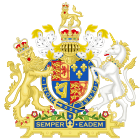Foreign Protestants Naturalization Act 1708 facts for kids
| Act of Parliament | |

|
|
| Long title | An Act for naturalizing Foreign Protestants. |
|---|---|
| Citation | 7 Ann. c. 9 (Ruffhead c. 5) |
| Dates | |
| Royal assent | 23 March 1709 |
| Other legislation | |
| Repealed by | |
|
Status: Repealed
|
|
| Text of statute as originally enacted | |
| Naturalization Act 1711 | |
|---|---|
| Act of Parliament | |

|
|
| Long title | An Act to repeal the Act of the Seventh Year of Her Majesty's Reign, intituled, "An Act for naturalizing Foreign Protestants," except what relates to the Children of Her Majesty's Natural-born Subjects, born out of Her Majesty's Allegiance. |
| Citation | 10 Ann. c. 9 (Ruffhead c. 5) |
| Dates | |
| Royal assent | 9 February 1712 |
| Other legislation | |
| Repealed by | Statute Law Revision Act 1867 |
|
Status: Repealed
|
|
The Foreign Protestants Naturalization Act 1708 was an important law passed in Great Britain. It allowed many foreign Protestants to become citizens of Britain. This law was especially helpful for French Protestants, called Huguenots, who had to leave their home country.
Contents
Becoming a British Citizen
This law, passed on March 23, 1709, helped people become "naturalised." This means they could become full citizens of a new country. At the time, the British calendar still considered this date part of 1708.
Why Was This Law Needed?
The Act was created to help Huguenots. These were French Protestants who faced harsh treatment in France. Many had fled to Britain after 1685. This was when the Edict of Nantes was cancelled in France. That law had previously given Protestants some rights.
The British Parliament, mostly the Whig political group, supported this new law. Some people worried that too many foreigners would come to Britain. However, the law's supporters argued that more people would make the nation stronger and richer.
What Did the Act Do?
The law made it possible for all foreign Protestants to become British citizens. They had to promise loyalty to the government. They also had to take part in a religious ceremony, called a sacrament, in any Protestant church.
After the law passed, many people arrived in Britain. Between May and June 1709, about 12,000 German Protestants came. These included people from places like Palatine and Suabia. They were fleeing wars in their homelands. Some German Catholics who arrived were sent back. Other immigrants were sent to Ireland, New York, and Carolina.
Why Was the Law Changed?
The Foreign Protestants Naturalization Act 1708 did not last long. Another political group, the Tories, largely cancelled it in 1711. This was done with a new law called the Naturalization Act 1711.
However, one important part of the 1708 Act remained. This part said that children born outside Britain to British parents would still be considered British citizens. This meant that if British citizens had children while living abroad, those children would have the same rights as if they were born in Britain.
 | May Edward Chinn |
 | Rebecca Cole |
 | Alexa Canady |
 | Dorothy Lavinia Brown |

